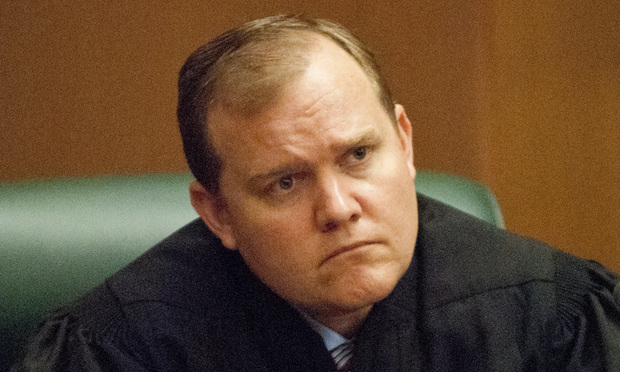RICO Conviction Stands for Taking Romantic Trips on Stolen Cash
In a trial before Cobb County Superior Court Judge Reuben Green, a jury convicted Robert Whaley on one count of violating Georgia's Racketeer Influenced and Corrupt Organizations Act for “acquiring money and property through a pattern of racketeering activity,” Judge Brian Rickman wrote.
November 07, 2017 at 05:48 PM
6 minute read
 Judge Brian Rickman, Georgia Court of Appeals (Photo: John Disney/ ALM)
Judge Brian Rickman, Georgia Court of Appeals (Photo: John Disney/ ALM) The Georgia Court of Appeals has upheld a RICO conviction for a man accused of having a romance with a woman and helping her steal $800,000 from her employer, using the money to pay bills and take vacations to Jamaica, Alaska, San Francisco and New York.
In a trial before Cobb County Superior Court Judge Reuben Green, a jury convicted Robert Whaley on one count of violating Georgia's Racketeer Influenced and Corrupt Organizations Act for “acquiring money and property through a pattern of racketeering activity,” Judge Brian Rickman wrote for a panel that included Presiding Judge John Ellington and Judge Gary Andrews.
Whaley appealed, contending the evidence was insufficient, the RICO prosecution was too late, the judge made a mistake in allowing prosecutors to present evidence of similar acts and his trial lawyer was ineffective.
“We find no error and affirm,” Rickman said.
Allowing evidence of similar acts was appropriate because it related to motive, Rickman said—“the reason that nudges the will and prods the mind to indulge in the criminal intent.”
Allegations of his defense lawyer's poor trial performance were irrelevant, the panel ruled.
“Whaley also asserts that his trial counsel rendered ineffective assistance for failing to timely raise the proper objection to the extrinsic act evidence,” Rickman wrote. “In order to succeed on his claim for ineffective assistance of counsel, however, Whaley must establish both that his trial court's performance was deficient, and that the deficiency prejudiced his defense; the failure to show either prong is fatal to his claim.”
Ashleigh Merchant of the Merchant Law Firm in Marietta defended Whaley on appeal.
“We were disappointed that the court did not agree with us that the prosecution was time-barred and that there was insufficient evidence against our client, Robert Whaley,” Merchant said Tuesday. “We felt strongly that Mr. Whaley was a pawn in his co-defendant's criminal scheme and lacked the criminal knowledge required to be convicted of this crime.”
The co-defendant, Sharron Rice, pleaded guilty to the charges of stealing from her employer, DEL Development Corporation, where she was an accounts payable manager and eventually an assistant comptroller. Her salary range was $42,000 to $54,000. She resigned the Monday after her boss announced he was ordering an audit because he had noticed questionable activity. He also said he was suspicious of her demeanor when he brought up the subject, Rickman wrote.
Rice issued checks from her employer to a company she and Whaley called Hughes Services. They opened a Hughes account and funneled money from it into different accounts of their own, Rickman said.
Though Whaley lost the appeal, the opinion did seem to give some credence to Merchant's contention that Whaley had been a pawn. Wrote Rickman: “Rice admitted that the purpose of moving funds stolen from DEL between the various accounts was to 'wash' the money, which is a common practice among white collar criminals and is intended to make it difficult to determine the source and/or volume of stolen funds.”
The case is Whaley v. State, No. A17A0848.
 Judge Brian Rickman, Georgia Court of Appeals (Photo: John Disney/ ALM)
Judge Brian Rickman, Georgia Court of Appeals (Photo: John Disney/ ALM) The Georgia Court of Appeals has upheld a RICO conviction for a man accused of having a romance with a woman and helping her steal $800,000 from her employer, using the money to pay bills and take vacations to Jamaica, Alaska, San Francisco and
In a trial before Cobb County Superior Court Judge
Whaley appealed, contending the evidence was insufficient, the RICO prosecution was too late, the judge made a mistake in allowing prosecutors to present evidence of similar acts and his trial lawyer was ineffective.
“We find no error and affirm,” Rickman said.
Allowing evidence of similar acts was appropriate because it related to motive, Rickman said—“the reason that nudges the will and prods the mind to indulge in the criminal intent.”
Allegations of his defense lawyer's poor trial performance were irrelevant, the panel ruled.
“Whaley also asserts that his trial counsel rendered ineffective assistance for failing to timely raise the proper objection to the extrinsic act evidence,” Rickman wrote. “In order to succeed on his claim for ineffective assistance of counsel, however, Whaley must establish both that his trial court's performance was deficient, and that the deficiency prejudiced his defense; the failure to show either prong is fatal to his claim.”
Ashleigh Merchant of the Merchant Law Firm in Marietta defended Whaley on appeal.
“We were disappointed that the court did not agree with us that the prosecution was time-barred and that there was insufficient evidence against our client, Robert Whaley,” Merchant said Tuesday. “We felt strongly that Mr. Whaley was a pawn in his co-defendant's criminal scheme and lacked the criminal knowledge required to be convicted of this crime.”
The co-defendant, Sharron Rice, pleaded guilty to the charges of stealing from her employer, DEL Development Corporation, where she was an accounts payable manager and eventually an assistant comptroller. Her salary range was $42,000 to $54,000. She resigned the Monday after her boss announced he was ordering an audit because he had noticed questionable activity. He also said he was suspicious of her demeanor when he brought up the subject, Rickman wrote.
Rice issued checks from her employer to a company she and Whaley called Hughes Services. They opened a Hughes account and funneled money from it into different accounts of their own, Rickman said.
Though Whaley lost the appeal, the opinion did seem to give some credence to Merchant's contention that Whaley had been a pawn. Wrote Rickman: “Rice admitted that the purpose of moving funds stolen from DEL between the various accounts was to 'wash' the money, which is a common practice among white collar criminals and is intended to make it difficult to determine the source and/or volume of stolen funds.”
The case is Whaley v. State, No. A17A0848.
This content has been archived. It is available through our partners, LexisNexis® and Bloomberg Law.
To view this content, please continue to their sites.
Not a Lexis Subscriber?
Subscribe Now
Not a Bloomberg Law Subscriber?
Subscribe Now
NOT FOR REPRINT
© 2025 ALM Global, LLC, All Rights Reserved. Request academic re-use from www.copyright.com. All other uses, submit a request to [email protected]. For more information visit Asset & Logo Licensing.
You Might Like
View All
Bankruptcy Filings Surged in First Half of 2024 Amid Uptick in Big Chapter 11 Cases
3 minute read
'Or They Could Have Fired Deloitte': Embattled CFO Appeals Case, Arguing Auditor Pressed Company Into Firing Him

Atlanta's 11th Circuit: Relying on CPA Not 'Reasonable Cause' to File Late Tax Returns, Even With E-Filed Forms

Report Suggests SEC Stepping Up Scrutiny of Deceitful Accounting
Trending Stories
- 1Supreme Court Takes Up Challenge to ACA Task Force
- 2'Tragedy of Unspeakable Proportions:' Could Edison, DWP, Face Lawsuits Over LA Wildfires?
- 3Meta Pulls Plug on DEI Programs
- 4On the Move and After Hours: Meyner and Landis; Cooper Levenson; Ogletree Deakins; Saiber
- 5State Budget Proposal Includes More Money for Courts—for Now
Who Got The Work
Michael G. Bongiorno, Andrew Scott Dulberg and Elizabeth E. Driscoll from Wilmer Cutler Pickering Hale and Dorr have stepped in to represent Symbotic Inc., an A.I.-enabled technology platform that focuses on increasing supply chain efficiency, and other defendants in a pending shareholder derivative lawsuit. The case, filed Oct. 2 in Massachusetts District Court by the Brown Law Firm on behalf of Stephen Austen, accuses certain officers and directors of misleading investors in regard to Symbotic's potential for margin growth by failing to disclose that the company was not equipped to timely deploy its systems or manage expenses through project delays. The case, assigned to U.S. District Judge Nathaniel M. Gorton, is 1:24-cv-12522, Austen v. Cohen et al.
Who Got The Work
Edmund Polubinski and Marie Killmond of Davis Polk & Wardwell have entered appearances for data platform software development company MongoDB and other defendants in a pending shareholder derivative lawsuit. The action, filed Oct. 7 in New York Southern District Court by the Brown Law Firm, accuses the company's directors and/or officers of falsely expressing confidence in the company’s restructuring of its sales incentive plan and downplaying the severity of decreases in its upfront commitments. The case is 1:24-cv-07594, Roy v. Ittycheria et al.
Who Got The Work
Amy O. Bruchs and Kurt F. Ellison of Michael Best & Friedrich have entered appearances for Epic Systems Corp. in a pending employment discrimination lawsuit. The suit was filed Sept. 7 in Wisconsin Western District Court by Levine Eisberner LLC and Siri & Glimstad on behalf of a project manager who claims that he was wrongfully terminated after applying for a religious exemption to the defendant's COVID-19 vaccine mandate. The case, assigned to U.S. Magistrate Judge Anita Marie Boor, is 3:24-cv-00630, Secker, Nathan v. Epic Systems Corporation.
Who Got The Work
David X. Sullivan, Thomas J. Finn and Gregory A. Hall from McCarter & English have entered appearances for Sunrun Installation Services in a pending civil rights lawsuit. The complaint was filed Sept. 4 in Connecticut District Court by attorney Robert M. Berke on behalf of former employee George Edward Steins, who was arrested and charged with employing an unregistered home improvement salesperson. The complaint alleges that had Sunrun informed the Connecticut Department of Consumer Protection that the plaintiff's employment had ended in 2017 and that he no longer held Sunrun's home improvement contractor license, he would not have been hit with charges, which were dismissed in May 2024. The case, assigned to U.S. District Judge Jeffrey A. Meyer, is 3:24-cv-01423, Steins v. Sunrun, Inc. et al.
Who Got The Work
Greenberg Traurig shareholder Joshua L. Raskin has entered an appearance for boohoo.com UK Ltd. in a pending patent infringement lawsuit. The suit, filed Sept. 3 in Texas Eastern District Court by Rozier Hardt McDonough on behalf of Alto Dynamics, asserts five patents related to an online shopping platform. The case, assigned to U.S. District Judge Rodney Gilstrap, is 2:24-cv-00719, Alto Dynamics, LLC v. boohoo.com UK Limited.
Featured Firms
Law Offices of Gary Martin Hays & Associates, P.C.
(470) 294-1674
Law Offices of Mark E. Salomone
(857) 444-6468
Smith & Hassler
(713) 739-1250






